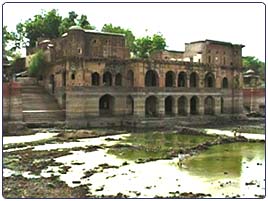IIT Army Marches to Rescue Krishna’s Lakes
By Tapas Chakraborty | Июл 05, 2008

Jul 02, LUCKNOW, INDIA (TELEGRAPH) — IIT engineers and water experts have pooled resources and skills to salvage the ancient kunds (ponds) of Vrindavan, Krishna’s childhood home. The water bodies, a big draw for tourists who throng Mathura, of which Vrindavan is a part, disappeared over the past 25 years, swallowed by encroachments and illegal constructions that changed the landscape.
Leading the restoration is NGO Braj Foundation, which counts engineers, hydrology experts and locals among its army of 100 volunteers desilting the ponds and reviving their water sources. They also raise public awareness.
“Silting killed the ponds. Then they were turned into garbage dumps and sludge tanks. Later, they were filled up,” said Vineet Narain, who heads the six-year-old foundation that is funded by global environment groups.
Over the past six years, as Mathura town was left high and dry by a water crisis, the volunteers have gone about removing garbage and restoring the aquifers – an underground water-bearing rock – that fed the ponds. In some, they dug channels to nearby rivers to get water.
One problem was the authorities’ lack of information. Members of the foundation who approached the administration with the restoration plans discovered that the officials didn’t know much about the ponds and their history of neglect, sources said. The state threw up its hands saying it had no funds but agreed to offer technical help from its water resources department.
“Virtually nothing was done to preserve the kunds. They could have solved drinking water problems. The Centre and the state never co-operated properly,” Narain said.
But irrigation department official J.B. Pandey insisted there wasn’t enough money to desilt the ponds and canals in Mathura district. “Silting was a common problem.”
With little information, the volunteers had to rely on satellite images of the area to find out the ponds’ size before they were overrun by silt and reclaimed for construction.
“Old maps were consulted. It was a kind of war for the team,” said Abhisekh Srivastava, an IIT engineer and a volunteer. Such efforts were required for around 375 kunds, some of which are said to be over 5,000 years old.
“The ghats (the flight of steps down to the ponds), unique for their architectural legacy, have crumbled. The areas around them have been encroached on,” Narain said.
Till 2002, tourists could spot only four such ponds in Vrindavan. These were the Balbhadra Kund, Saraswati Kund, Shiv Tal and the famous Potara Kund, where local lore has it that little Krishna’s clothes were washed.
“Braj (which is part of Vrindavan) had over 1,000 kunds once. They helped retain groundwater,” said historian R.K. Sharma. Some ponds, like Darshan Sarovar in Badhauta village, were also bird sanctuaries.
In some ways, Narain and his team are on a mission left unfinished by Ramesh Baba, a local saint who had started work on restoring the ponds in the 1990s but died before he could complete the task. “He is the inspiration behind Braj Foundation,” said a volunteer. Among the big ponds restored are Brahma Kund, said to be a Radha-Krishna playground, Chandra Sarovar and Roop Kund.















